VOA慢速英语 2008 0424b
时间:2018-12-15 作者:英语课 分类:VOA慢速英语2008年(四)月
George Washington became America's first president in seventeen eighty-nine. He had commanded the forces of the American colonies in their successful rebellion against Britain. Washington was elected without opposition 1. But American politics were about to change. This week in our series, Frank Oliver and Ray Freeman describe the beginnings of the two-party political system in the United States.
(MUSIC)
VOICE TWO:
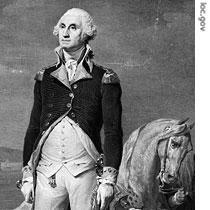
George Washington
George Washington did not belong to a political party. There were no political parties in America at that time. This does not mean all Americans held the same political beliefs. They did not. But there were no established organizations that offered candidates for elections.
Two such organizations began to take shape during President Washington's first administration. One was called the Federalists. Its leader was Treasury 2 Secretary Alexander Hamilton. The other was called the Republicans. Its leader was Secretary of State Thomas Jefferson. Each group represented the political beliefs of its leader.
VOICE ONE:
Hamilton and the Federalists wanted a strong national government with a powerful president and courts. They supported policies that helped bankers and wealthy businessmen. They urged close economic and diplomatic ties with Britain. They did not like democracy, which they described as mob rule.
The Federalist Party led by Alexander Hamilton was not the same as an earlier group also called Federalists.
The word was used to describe those who supported the new American Constitution. Those who opposed the Constitution were known as anti-Federalists.
Some early Federalists, like Hamilton, later became members of the Federalist Party. They were extremely powerful. They controlled the Congress during the presidency 3 of George Washington. And they almost controlled Washington himself, through his dependence 4 on Alexander Hamilton.
VOICE TWO:
Thomas Jefferson and the Republicans supported the Constitution as a plan of government. But they did not think the Constitution gave the national government unlimited 5 powers.
They supported policies that helped the nation's farmers and small businessmen. They urged closer ties with the French people, who were rebelling against their king. And they demanded more rights, more democracy, for the people of the United States.
VOICE ONE:
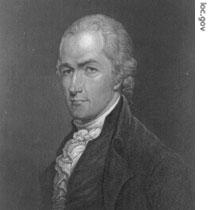
Alexander Hamilton
The men who led these two groups were very different.
Alexander Hamilton of the aristocratic Federalists was not born to an established, upper-class American family. He was born in the West Indies to a man and woman who were not married. However, Hamilton was educated in America. And he gained a place in society by marrying the daughter of a wealthy landowner in New York state.
Money and position were important to Hamilton. He believed men of money and position should govern the nation.
Thomas Jefferson of the Democratic Republicans could have been what Alexander Hamilton wanted to be. Through his mother, he was distantly related to British noblemen. And he liked fine food, wine, books, and music.
But Jefferson had great respect for simple farmers and for the men who opened America's western lands to settlement. He believed they, too, had a right to govern the nation.
VOICE TWO:
Both Alexander Hamilton and Thomas Jefferson were loyal Americans. Yet they held completely opposing opinions on how America's government should operate.
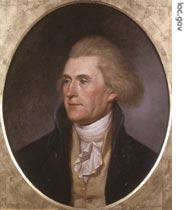
Thomas Jefferson
Their personal disagreements turned into a public dispute when they served in President Washington's cabinet. The two men did not argue directly in public, however. They fought their war of words in two newspapers.
Both knew the power of the press. Jefferson, especially, felt the need for newspapers in a democracy. He believed they provided the only way for a large population to know the truth. He once said: "If I had to choose between a government without newspapers, or newspapers without a government, I would choose newspapers without a government."
VOICE ONE:
Hamilton already had experience in using newspapers for political purposes.
During the American Revolutionary War, Hamilton served as an assistant to George Washington, the commander-in-chief. One of his jobs was to get money and supplies for the army.
Hamilton asked the thirteen state governments. He also asked the Congress, which had little political power at that time. He got almost no help from either.
Hamilton felt the new system of government under the Articles of Confederation was weak and disorganized. He did not think the states should have so much power. What America needed, he said, was a strong central government. Without it, the Confederation would break apart.
VOICE TWO:
Hamilton expressed his opinions in several newspaper articles. He did not put his own name on the articles. He signed them "The Continentalist."
He soon became one of the strongest voices calling for a convention to amend 6 the Articles of Confederation. This was the convention that finally met in Philadelphia in seventeen eighty-seven and wrote the American Constitution.
Hamilton was one of the delegates. Afterwards, he helped write a series of newspaper articles to win support for the Constitution. These were the Federalist Papers, written together with James Madison and John Jay.
VOICE ONE:
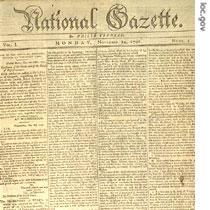
Philip Freneau's National Gazette was the first official Republican newspaper. During its two-year existence, it was the leading critic of Federalist policies.
When Hamilton became treasury secretary under President Washington, he continued to use the press. Only now, he was trying to win support for his own policies.
Hamilton spoke 7 through a newspaper called the Gazette of the United States. Its editor was John Fenno.
Jefferson won the support of several newspapers. But these were not part of his political movement. It was important, he felt, to have one newspaper speak for him. James Madison found it for him. It would be edited by Madison's old friend Philip Freneau. It would be called the National Gazette.
VOICE TWO:
Most of the people who supported Hamilton lived in the cities of the northeast. They were the nation's bankers and big businessmen. They were lawyers, doctors, and clergymen.
Jefferson respected Hamilton's political power. But he saw that Hamilton did not have a national organization of common people.
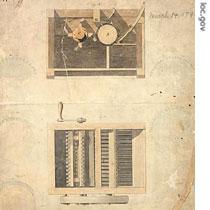
The cotton gin made cotton a profitable crop in the U.S. The machine shown, invented by Eli Whitney, received a patent in 1794.
In the seventeen nineties, ninety percent of Americans were farmers, laborers 8, and small businessmen. They were bitter over government policies that always seemed to help bankers, big landowners, and wealthy businessmen. They had no political party to speak for them. These were the people Thomas Jefferson wanted to reach.
VOICE ONE:
Jefferson's task was big. Many of these Americans knew little of what was happening outside their local area. Many were not permitted to vote, because they did not own property.
Jefferson looked at the situation in each state. Almost everywhere he found local political groups fighting against state laws that helped the rich. Here was what Jefferson needed. If these local groups could be brought together into a national party, the Federalists would finally have some organized opposition.
Jefferson's party included rich men and poor men. They joined together to fight what they saw as a misuse 9 of power by Federalists in the national government.
We will continue our story next week.
(MUSIC)
ANNOUNCER:
Our program was written by Christine Johnson and read by Frank Oliver and Ray Freeman. Join us again next week for THE MAKING OF A NATION, an American history series in VOA Special English. Transcripts 10, podcasts and MP3s of our programs are at voaspecialenglish.com.
- The party leader is facing opposition in his own backyard.该党领袖在自己的党內遇到了反对。
- The police tried to break down the prisoner's opposition.警察设法制住了那个囚犯的反抗。
- The Treasury was opposed in principle to the proposals.财政部原则上反对这些提案。
- This book is a treasury of useful information.这本书是有价值的信息宝库。
- Roosevelt was elected four times to the presidency of the United States.罗斯福连续当选四届美国总统。
- Two candidates are emerging as contestants for the presidency.两位候选人最终成为总统职位竞争者。
- Doctors keep trying to break her dependence of the drug.医生们尽力使她戒除毒瘾。
- He was freed from financial dependence on his parents.他在经济上摆脱了对父母的依赖。
- They flew over the unlimited reaches of the Arctic.他们飞过了茫茫无边的北极上空。
- There is no safety in unlimited technological hubris.在技术方面自以为是会很危险。
- The teacher advised him to amend his way of living.老师劝他改变生活方式。
- You must amend your pronunciation.你必须改正你的发音。
- They sourced the spoke nuts from our company.他们的轮辐螺帽是从我们公司获得的。
- The spokes of a wheel are the bars that connect the outer ring to the centre.辐条是轮子上连接外圈与中心的条棒。
- Laborers were trained to handle 50-ton compactors and giant cranes. 工人们接受操作五十吨压土机和巨型起重机的训练。 来自《现代英汉综合大词典》
- Wage-labour rests exclusively on competition between the laborers. 雇佣劳动完全是建立在工人的自相竞争之上的。 来自英汉非文学 - 共产党宣言
- It disturbs me profoundly that you so misuse your talents.你如此滥用自己的才能,使我深感不安。
- He was sacked for computer misuse.他因滥用计算机而被解雇了。
- Like mRNA, both tRNA and rRNA are transcripts of chromosomal DNA. tRNA及rRNA同mRNA一样,都是染色体DNA的转录产物。 来自辞典例句
- You can't take the transfer students'exam without your transcripts. 没有成绩证明书,你就不能参加转学考试。 来自辞典例句